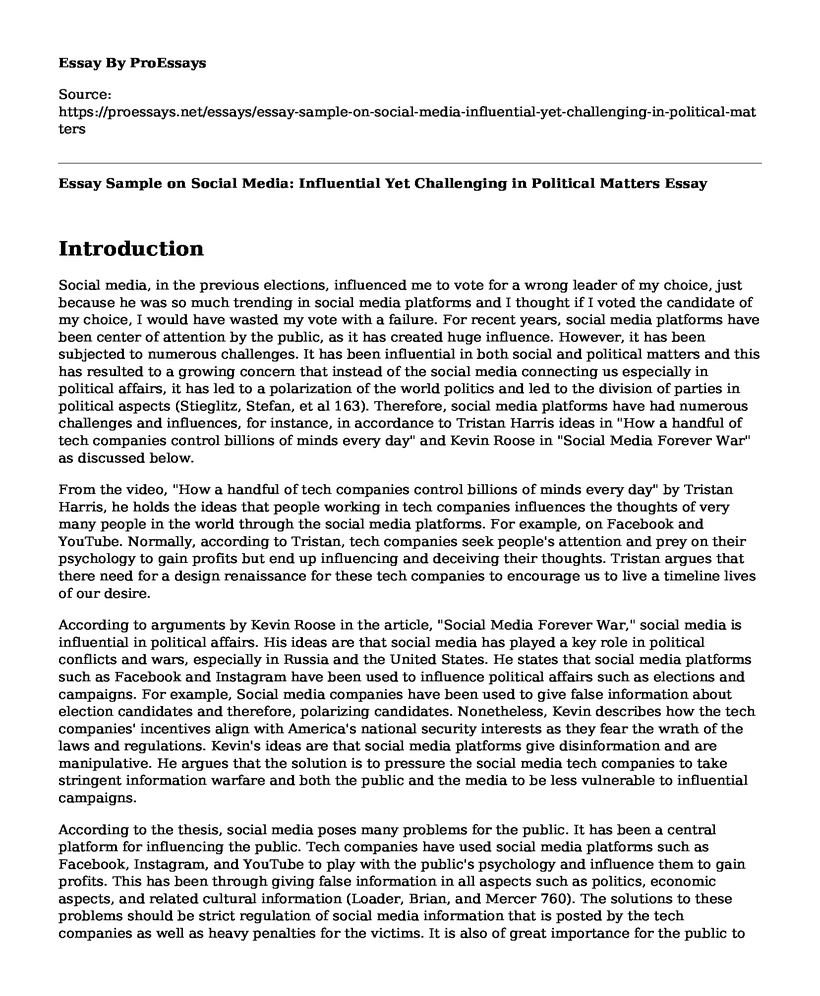Introduction
Social media, in the previous elections, influenced me to vote for a wrong leader of my choice, just because he was so much trending in social media platforms and I thought if I voted the candidate of my choice, I would have wasted my vote with a failure. For recent years, social media platforms have been center of attention by the public, as it has created huge influence. However, it has been subjected to numerous challenges. It has been influential in both social and political matters and this has resulted to a growing concern that instead of the social media connecting us especially in political affairs, it has led to a polarization of the world politics and led to the division of parties in political aspects (Stieglitz, Stefan, et al 163). Therefore, social media platforms have had numerous challenges and influences, for instance, in accordance to Tristan Harris ideas in "How a handful of tech companies control billions of minds every day" and Kevin Roose in "Social Media Forever War" as discussed below.
From the video, "How a handful of tech companies control billions of minds every day" by Tristan Harris, he holds the ideas that people working in tech companies influences the thoughts of very many people in the world through the social media platforms. For example, on Facebook and YouTube. Normally, according to Tristan, tech companies seek people's attention and prey on their psychology to gain profits but end up influencing and deceiving their thoughts. Tristan argues that there need for a design renaissance for these tech companies to encourage us to live a timeline lives of our desire.
According to arguments by Kevin Roose in the article, "Social Media Forever War," social media is influential in political affairs. His ideas are that social media has played a key role in political conflicts and wars, especially in Russia and the United States. He states that social media platforms such as Facebook and Instagram have been used to influence political affairs such as elections and campaigns. For example, Social media companies have been used to give false information about election candidates and therefore, polarizing candidates. Nonetheless, Kevin describes how the tech companies' incentives align with America's national security interests as they fear the wrath of the laws and regulations. Kevin's ideas are that social media platforms give disinformation and are manipulative. He argues that the solution is to pressure the social media tech companies to take stringent information warfare and both the public and the media to be less vulnerable to influential campaigns.
According to the thesis, social media poses many problems for the public. It has been a central platform for influencing the public. Tech companies have used social media platforms such as Facebook, Instagram, and YouTube to play with the public's psychology and influence them to gain profits. This has been through giving false information in all aspects such as politics, economic aspects, and related cultural information (Loader, Brian, and Mercer 760). The solutions to these problems should be strict regulation of social media information that is posted by the tech companies as well as heavy penalties for the victims. It is also of great importance for the public to be vulnerable to information from social media and seek effective clarifications before making conclusions about social media information. It is effective for every tech company to regulate the spread of propaganda on social media platforms.
The comparison of my arguments with the evaluation of the Tristan and Kevin arguments is that we have similar solutions to the problems of social media platforms and tech companies. Furthermore, the problems of tech companies and social media platforms are about my solutions to the problem. My previous experiences on the influence of social media have been the persuasive framework for my solutions of discussion.
Conclusion
In conclusion, it is justified that tech companies have used social media platforms for their benefits of gaining profits while giving false and influential information that misleads the public. Therefore, it is of great importance to address the issue because if there is no realization, the social media will continue to influence the public giving false and deceiving information, waste peoples time, polarize various political issues and even result to differences and enmity especially in political aspects.
Works Cited
Bennett, W. Lance. "The personalization of politics: Political identity, social media, and changing patterns of participation." The ANNALS of the American Academy of Political and Social Science 644.1 (2012): 20-39.
Loader, Brian D., and Dan Mercea. "Networking democracy? Social media innovations and participatory politics." Information, Communication & Society 14.6 (2011): 757-769.
Stieglitz, Stefan, et al. "Social media analytics-Challenges in topic discovery, data collection, and data preparation." International journal of information management 39 (2018): 156-168.
Cite this page
Essay Sample on Social Media: Influential Yet Challenging in Political Matters. (2023, Jan 14). Retrieved from https://proessays.net/essays/essay-sample-on-social-media-influential-yet-challenging-in-political-matters
If you are the original author of this essay and no longer wish to have it published on the ProEssays website, please click below to request its removal:
- Theme and Symbols Combine With Stories: Paper Example
- Regression Analysis Interpretation - Paper Example
- The Victual Painting Still Life of Oranges and Lemons with Blue Gloves by Vincent van Gogh Essay
- Essay Sample on Texas: Red State in US Elections Since '76
- Essay on Chungking Express: Wong Kar-Wai's Two-Part Tale of Love and Midnight Snacks
- Essay on How Walt Disney Ruined Our Love Lives: The Impact on Modern Romantic Relationships
- Symbolism and Perspective Essay







